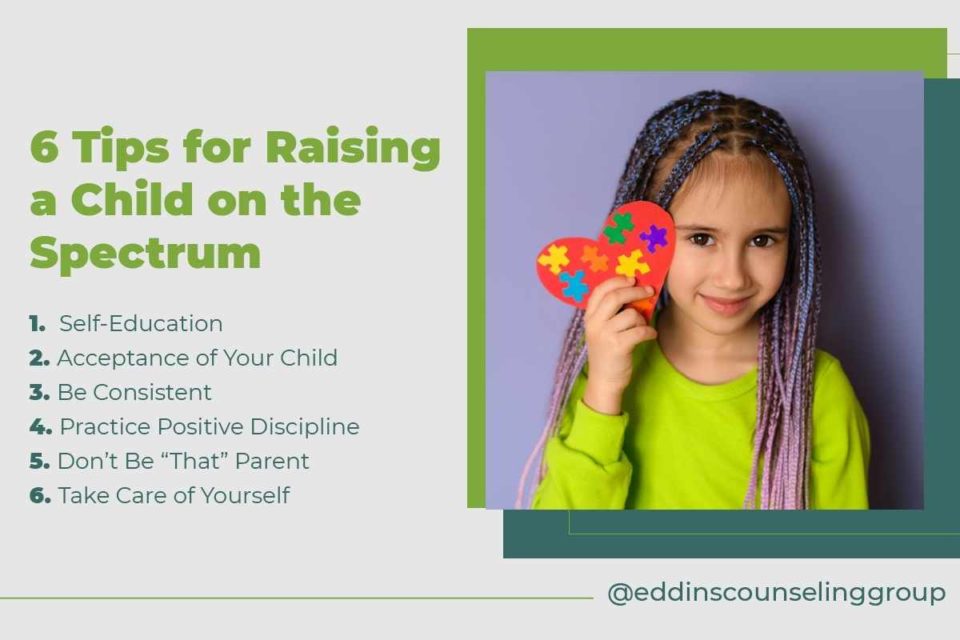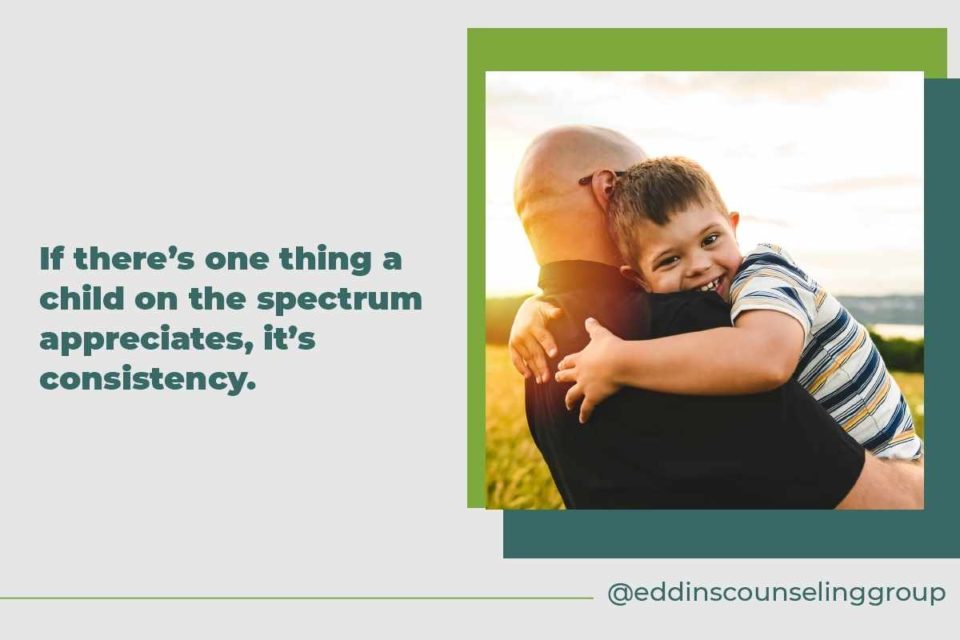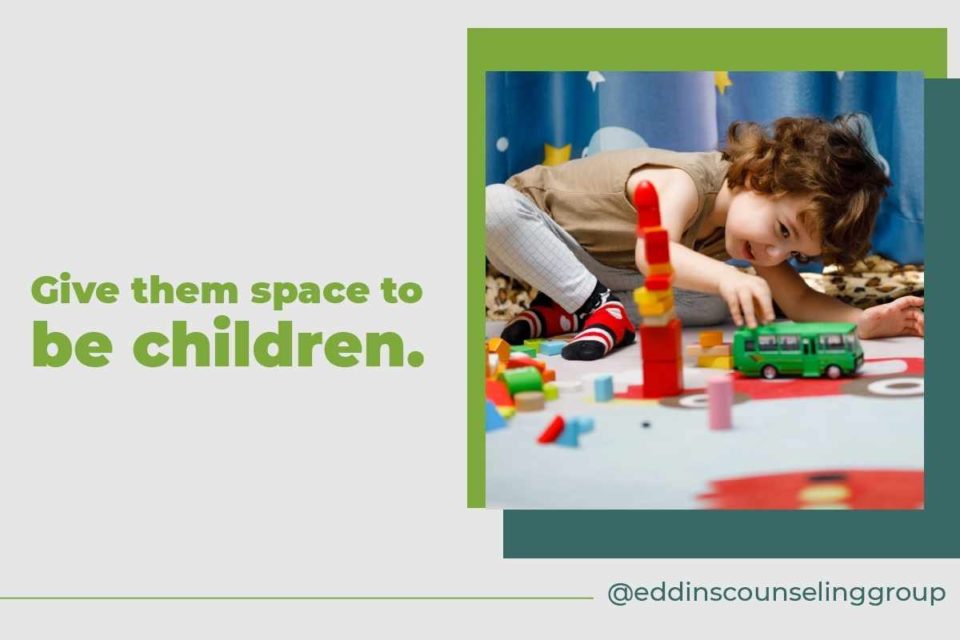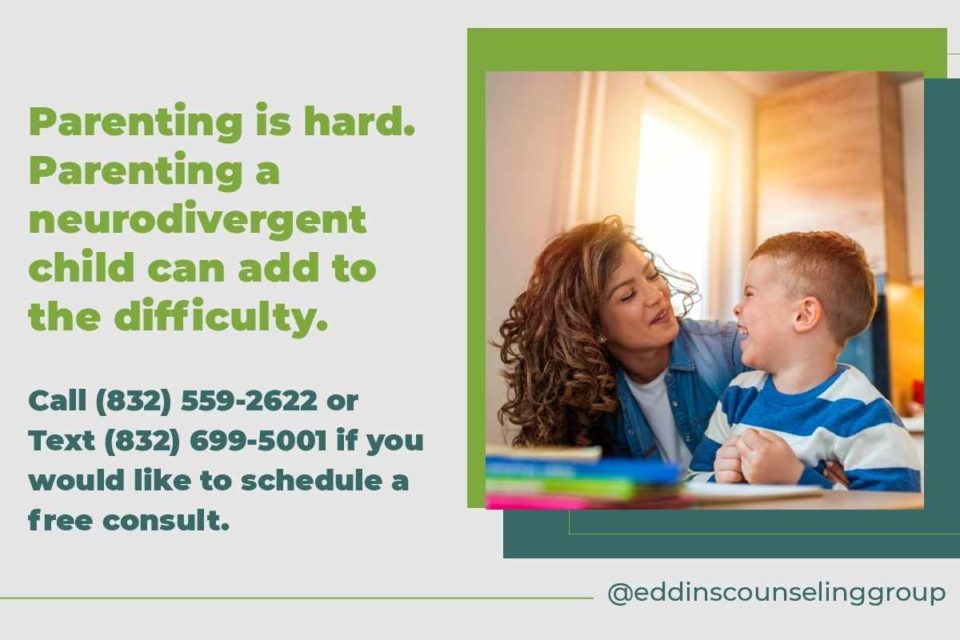October 10, 2022
6 Tips for Raising a Child on the Spectrum
Written by Rachel Eddins
Posted in ADHD/Autism and with tags: Communication, autism, parenting

If your child has Autism Spectrum Disorder (ASD), it will change some of your behaviors and expectations.
Raising a child on the spectrum may feel daunting at first.
- What should you do?
- Who can you trust when it comes to getting advice?
- Can you make a difference in the quality of your child’s life?
Well, rest assured that you are in the position to help your children acquire essential skills.
With your support and guidance, they can often overcome some of the challenges that ASD presents. A child on the spectrum can learn and thrive.
To help you help them, let’s explore some practical tips to keep in mind:

6 Tips for Raising a Child on the Spectrum
1. Self-Education
In order to make informed decisions for your child, well… you have to be informed. And you have to stay informed. Make this commitment early and often.
Learn about Autism treatment options and never let anyone make a treatment decision without your input.
You may never know as much about ASD as the experts. But remember, they will never know as much about your child as you do.
Keep a journal to monitor your child’s triggers, likes and dislikes, routines, and more. Such information is essential when it comes to serving your child the best possible care.
2. Acceptance
This means acceptance of your child. Recalibrate your expectations but not your love and acceptance.
They need to know you love them regardless of what makes them different. Your unconditional love plays a major role in their ability to function and enjoy their life.
Stop comparing them with other children. Accept them, support them, and advocate for them.
Read More: Parenting tips to nourish your child’s mental health.
3. Be Consistent
If there’s one thing a child on the spectrum appreciates, it’s consistency. Your kid will be grateful for the routines you create, even if they don’t specifically say it.
When learning new life skills, your consistency will go a long way. But be sure to coordinate with their therapists and teachers, so the routines carry over elsewhere in their lives.
Pro tip: Keep a consistent routine even with fun times.

4. Practice Positive Discipline
Just about every parent can point out when their kid is messing up. But all children—including those with ASD—thrive most when they get positive discipline.
As a parent, you can be both kind and firm simultaneously. You can also show respect and encouragement when correcting behavior.
Take a big-picture approach. Consider the long-term and always make time to offer compliments and positive feedback for constructive behaviors.
5. Don’t Be “That” Parent
When interacting with parents of other children with ASD, never forget that this is not a contest. This type of competitive mindset can also be self-sabotaging when witnessing children with more typical development.
You don’t need to hover over your child like a helicopter. Keep an eye on them, of course. But don’t assume you have to smooth everything out all the time.
Give them space to learn for themselves.
Speaking of space, not every child on the spectrum needs to spend all day, every day, with therapists, teachers, activities, and programs. Allow them some calm time, too.
6. Take Care of Yourself
Self-care is your friend. Parenting is hard in any situation. When your child has ASD, it can be especially difficult. Balance that with some fun time and rest time of your own.
Also, set yourself up with a routine of your own. Take care of your sleep patterns, eating habits, exercise consistency, and stress management.
No parent is expected to have it all figured out. To help with the challenges, therapy can be invaluable. Let’s connect and talk about it soon.
Communicating with Your Neurodivergent Child
A neurodivergent child can often have unique ways of communicating. Such children are usually aware that they communicate differently. Even so, they could really use some help. As a parent and caretaker, one of the most powerful steps you can take is to embrace the process of communication.
Demonstrate to your child that you are committed to helping and to understanding them.
Communication, of course, is a fundamental way to interact. There are many different kinds of neurodivergence. All of them can benefit from the steps you take and the adjustments you make to enhance your interactions.
Neurodivergence is not rare. Nearly 10% of children are diagnosed with ADHD, while dyslexia affects 20% of the U.S. population. About 2.3% of children have ASD.

5 Ways to Improve Communication with Your Neurodivergent Child
1. Practice and Encourage Acceptance
It’s tempting to nurture your child with phrases like, “you’re no different from anyone else.” It can be far more helpful to accept the challenges involved.
Use this acceptance to encourage your child to recognize what they need to do to overcome such challenges.
Remind them that the struggle is what will bring out the best in them.
2. Include Them in Conversations
It might seem logical not to include your child in your conversations with others.
They might not know how to involve themselves, and your cues can offer them an entry point. Gently give them cues to gauge their interest in participating.
Pay close attention in such situations as there is always a lot to learn that can further improve your one-on-one time with your child.
Bottom line: Never assume that your child would prefer to be excluded.

3. Become Fluent in Non-Verbal Communication
A neurodivergent child will learn other methods for getting their point across.
For you, it can feel like you’re learning a new language. But that can be fun, interesting, and quite fulfilling.
Elements to consider include:
- Vocal tone and inflection
- Facial expressions
- Posture
- Hand movements
- Body language
You may both reach a point where you realize that verbal communication is less than ideal in certain situations. Try writing or even drawing pictures to fill in the details you’re both trying to convey.
4. Stay on Point
It can be enriching to speak in metaphors or use subtle sarcasm to buttress your conversational points.
When interacting with your neurodivergent child, it’s almost always best to stay on point.
Use short, clear sentences. Augment those sentences with the methods discussed in #3 above.
5. Never Forget Their Age
Neurotypical or neurodivergent, a kid is a kid. That means a certain level of immaturity will color their communication style.
Factor this in. Give them space to be children.
Lower your expectations when necessary. This serves as a helpful reminder that you’re on their side.
Sometimes, the Parents Need the Support and Understanding
Parenting is hard. Parenting a neurodivergent child can add to the difficulty.
Meanwhile, you have your own life, issues, thoughts, and emotions. No one expects you to figure it all out alone.
That’s why so many parents commit to therapy as a way to build up their own resistance. If you need some confidential space to talk about your life as a parent, we’re here for you.
For additional support, to connect with our parents, and to share your story/listen to stories from other parents, consider joining our Resilient Parenting Support Group.
Get started today with one of our Houston, Montrose, or Sugar Land therapists and learn parenting skills and receive parenting support.
Grounding & Self Soothing
Get instant access to your free ebook.
















